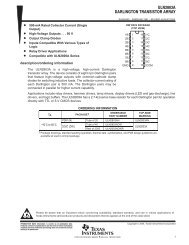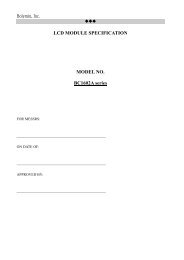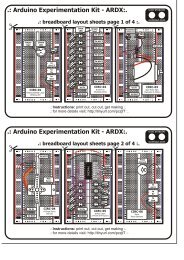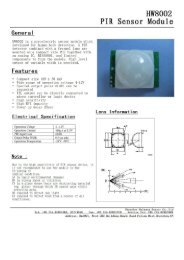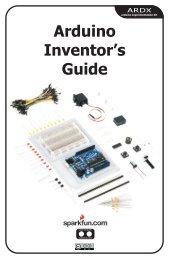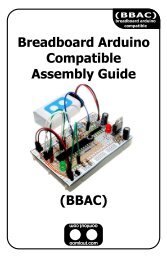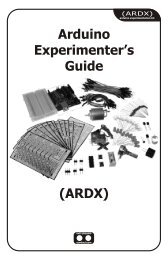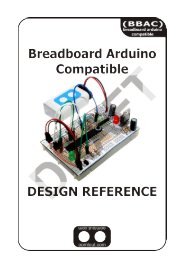- Page 1 and 2:
Features• High Performance, Low P
- Page 3:
ATmega48A/PA/88A/PA/168A/PA/328/P1.
- Page 7 and 8:
ATmega48A/PA/88A/PA/168A/PA/328/PTa
- Page 9 and 10:
ATmega48A/PA/88A/PA/168A/PA/328/P7.
- Page 11 and 12:
ATmega48A/PA/88A/PA/168A/PA/328/Psp
- Page 13 and 14:
ATmega48A/PA/88A/PA/168A/PA/328/P7.
- Page 15 and 16:
ATmega48A/PA/88A/PA/168A/PA/328/P7.
- Page 17 and 18:
ATmega48A/PA/88A/PA/168A/PA/328/P8.
- Page 19 and 20:
ATmega48A/PA/88A/PA/168A/PA/328/P8.
- Page 21 and 22:
ATmega48A/PA/88A/PA/168A/PA/328/P8.
- Page 23 and 24:
ATmega48A/PA/88A/PA/168A/PA/328/P
- Page 25 and 26:
ATmega48A/PA/88A/PA/168A/PA/328/PAs
- Page 27 and 28:
ATmega48A/PA/88A/PA/168A/PA/328/P9.
- Page 29 and 30:
ATmega48A/PA/88A/PA/168A/PA/328/Pse
- Page 31 and 32:
ATmega48A/PA/88A/PA/168A/PA/328/PTa
- Page 33 and 34:
ATmega48A/PA/88A/PA/168A/PA/328/P9.
- Page 35 and 36:
ATmega48A/PA/88A/PA/168A/PA/328/P9.
- Page 37 and 38:
ATmega48A/PA/88A/PA/168A/PA/328/PWh
- Page 39 and 40:
ATmega48A/PA/88A/PA/168A/PA/328/PTh
- Page 41 and 42:
ATmega48A/PA/88A/PA/168A/PA/328/P10
- Page 43 and 44:
ATmega48A/PA/88A/PA/168A/PA/328/P10
- Page 45 and 46:
ATmega48A/PA/88A/PA/168A/PA/328/P10
- Page 47 and 48:
ATmega48A/PA/88A/PA/168A/PA/328/P
- Page 49 and 50:
ATmega48A/PA/88A/PA/168A/PA/328/PFi
- Page 51 and 52:
ATmega48A/PA/88A/PA/168A/PA/328/PFi
- Page 53 and 54:
ATmega48A/PA/88A/PA/168A/PA/328/Pmo
- Page 55 and 56:
ATmega48A/PA/88A/PA/168A/PA/328/PTh
- Page 57 and 58:
ATmega48A/PA/88A/PA/168A/PA/328/PWa
- Page 59 and 60:
ATmega48A/PA/88A/PA/168A/PA/328/P12
- Page 61 and 62:
ATmega48A/PA/88A/PA/168A/PA/328/P12
- Page 63 and 64:
ATmega48A/PA/88A/PA/168A/PA/328/PWh
- Page 65 and 66:
ATmega48A/PA/88A/PA/168A/PA/328/PTa
- Page 67 and 68:
ATmega48A/PA/88A/PA/168A/PA/328/PAd
- Page 69 and 70:
ATmega48A/PA/88A/PA/168A/PA/328/P0x
- Page 71 and 72:
ATmega48A/PA/88A/PA/168A/PA/328/Pa.
- Page 73 and 74:
ATmega48A/PA/88A/PA/168A/PA/328/P13
- Page 75 and 76:
ATmega48A/PA/88A/PA/168A/PA/328/P13
- Page 77 and 78:
ATmega48A/PA/88A/PA/168A/PA/328/P14
- Page 79 and 80:
ATmega48A/PA/88A/PA/168A/PA/328/PIf
- Page 81 and 82:
ATmega48A/PA/88A/PA/168A/PA/328/PAs
- Page 83 and 84:
ATmega48A/PA/88A/PA/168A/PA/328/PTa
- Page 85 and 86:
ATmega48A/PA/88A/PA/168A/PA/328/PAS
- Page 87 and 88:
ATmega48A/PA/88A/PA/168A/PA/328/PTa
- Page 89 and 90:
ATmega48A/PA/88A/PA/168A/PA/328/P
- Page 91 and 92:
ATmega48A/PA/88A/PA/168A/PA/328/PTh
- Page 93 and 94:
ATmega48A/PA/88A/PA/168A/PA/328/PTa
- Page 95 and 96:
ATmega48A/PA/88A/PA/168A/PA/328/P14
- Page 97 and 98:
ATmega48A/PA/88A/PA/168A/PA/328/PFi
- Page 99 and 100:
ATmega48A/PA/88A/PA/168A/PA/328/PTh
- Page 101 and 102:
ATmega48A/PA/88A/PA/168A/PA/328/PFi
- Page 103 and 104:
ATmega48A/PA/88A/PA/168A/PA/328/Pth
- Page 105 and 106:
ATmega48A/PA/88A/PA/168A/PA/328/PFi
- Page 107 and 108:
ATmega48A/PA/88A/PA/168A/PA/328/PFi
- Page 109 and 110:
ATmega48A/PA/88A/PA/168A/PA/328/PTa
- Page 111 and 112:
ATmega48A/PA/88A/PA/168A/PA/328/P15
- Page 113 and 114:
ATmega48A/PA/88A/PA/168A/PA/328/P15
- Page 115 and 116:
ATmega48A/PA/88A/PA/168A/PA/328/P16
- Page 117 and 118:
ATmega48A/PA/88A/PA/168A/PA/328/Ppu
- Page 119 and 120:
ATmega48A/PA/88A/PA/168A/PA/328/PAs
- Page 121 and 122:
ATmega48A/PA/88A/PA/168A/PA/328/P16
- Page 123 and 124:
ATmega48A/PA/88A/PA/168A/PA/328/Pti
- Page 125 and 126:
ATmega48A/PA/88A/PA/168A/PA/328/Ppr
- Page 127 and 128:
ATmega48A/PA/88A/PA/168A/PA/328/Pno
- Page 129 and 130:
ATmega48A/PA/88A/PA/168A/PA/328/PTh
- Page 131 and 132:
ATmega48A/PA/88A/PA/168A/PA/328/P0x
- Page 133 and 134:
ATmega48A/PA/88A/PA/168A/PA/328/Pth
- Page 135 and 136:
ATmega48A/PA/88A/PA/168A/PA/328/PFi
- Page 137 and 138:
ATmega48A/PA/88A/PA/168A/PA/328/PTa
- Page 139 and 140:
ATmega48A/PA/88A/PA/168A/PA/328/PWh
- Page 141 and 142:
ATmega48A/PA/88A/PA/168A/PA/328/PTh
- Page 143 and 144:
ATmega48A/PA/88A/PA/168A/PA/328/P17
- Page 145 and 146:
ATmega48A/PA/88A/PA/168A/PA/328/P17
- Page 147 and 148:
ATmega48A/PA/88A/PA/168A/PA/328/P18
- Page 149 and 150:
ATmega48A/PA/88A/PA/168A/PA/328/PFi
- Page 151 and 152:
ATmega48A/PA/88A/PA/168A/PA/328/P18
- Page 153 and 154:
ATmega48A/PA/88A/PA/168A/PA/328/PIn
- Page 155 and 156:
ATmega48A/PA/88A/PA/168A/PA/328/Pou
- Page 157 and 158:
ATmega48A/PA/88A/PA/168A/PA/328/P18
- Page 159 and 160:
ATmega48A/PA/88A/PA/168A/PA/328/P(R
- Page 161 and 162:
ATmega48A/PA/88A/PA/168A/PA/328/PTa
- Page 163 and 164:
ATmega48A/PA/88A/PA/168A/PA/328/P18
- Page 165 and 166:
ATmega48A/PA/88A/PA/168A/PA/328/P18
- Page 167 and 168:
ATmega48A/PA/88A/PA/168A/PA/328/PTh
- Page 169 and 170: ATmega48A/PA/88A/PA/168A/PA/328/PFi
- Page 171 and 172: ATmega48A/PA/88A/PA/168A/PA/328/PAs
- Page 173 and 174: ATmega48A/PA/88A/PA/168A/PA/328/P19
- Page 175 and 176: ATmega48A/PA/88A/PA/168A/PA/328/P19
- Page 177 and 178: ATmega48A/PA/88A/PA/168A/PA/328/P19
- Page 179 and 180: ATmega48A/PA/88A/PA/168A/PA/328/PFi
- Page 181 and 182: ATmega48A/PA/88A/PA/168A/PA/328/PTa
- Page 183 and 184: ATmega48A/PA/88A/PA/168A/PA/328/PA
- Page 185 and 186: ATmega48A/PA/88A/PA/168A/PA/328/PAs
- Page 187 and 188: ATmega48A/PA/88A/PA/168A/PA/328/PAs
- Page 189 and 190: ATmega48A/PA/88A/PA/168A/PA/328/PAs
- Page 191 and 192: ATmega48A/PA/88A/PA/168A/PA/328/PTh
- Page 193 and 194: ATmega48A/PA/88A/PA/168A/PA/328/P20
- Page 195 and 196: ATmega48A/PA/88A/PA/168A/PA/328/PTa
- Page 197 and 198: ATmega48A/PA/88A/PA/168A/PA/328/Pta
- Page 199 and 200: ATmega48A/PA/88A/PA/168A/PA/328/PTa
- Page 201 and 202: ATmega48A/PA/88A/PA/168A/PA/328/P20
- Page 203 and 204: ATmega48A/PA/88A/PA/168A/PA/328/P
- Page 205 and 206: ATmega48A/PA/88A/PA/168A/PA/328/PTa
- Page 207 and 208: ATmega48A/PA/88A/PA/168A/PA/328/PTa
- Page 209 and 210: ATmega48A/PA/88A/PA/168A/PA/328/Pbe
- Page 211 and 212: ATmega48A/PA/88A/PA/168A/PA/328/PAs
- Page 213 and 214: ATmega48A/PA/88A/PA/168A/PA/328/P21
- Page 215 and 216: ATmega48A/PA/88A/PA/168A/PA/328/P
- Page 217 and 218: ATmega48A/PA/88A/PA/168A/PA/328/P22
- Page 219: ATmega48A/PA/88A/PA/168A/PA/328/P22
- Page 223 and 224: ATmega48A/PA/88A/PA/168A/PA/328/P22
- Page 225 and 226: ATmega48A/PA/88A/PA/168A/PA/328/P
- Page 227 and 228: ATmega48A/PA/88A/PA/168A/PA/328/P
- Page 229 and 230: ATmega48A/PA/88A/PA/168A/PA/328/P22
- Page 231 and 232: ATmega48A/PA/88A/PA/168A/PA/328/PAf
- Page 233 and 234: ATmega48A/PA/88A/PA/168A/PA/328/PFi
- Page 235 and 236: ATmega48A/PA/88A/PA/168A/PA/328/PFi
- Page 237 and 238: ATmega48A/PA/88A/PA/168A/PA/328/PTa
- Page 239 and 240: ATmega48A/PA/88A/PA/168A/PA/328/PTo
- Page 241 and 242: ATmega48A/PA/88A/PA/168A/PA/328/PFi
- Page 243 and 244: ATmega48A/PA/88A/PA/168A/PA/328/P
- Page 245 and 246: ATmega48A/PA/88A/PA/168A/PA/328/P22
- Page 247 and 248: ATmega48A/PA/88A/PA/168A/PA/328/PFi
- Page 249 and 250: ATmega48A/PA/88A/PA/168A/PA/328/P23
- Page 251 and 252: ATmega48A/PA/88A/PA/168A/PA/328/P23
- Page 253 and 254: ATmega48A/PA/88A/PA/168A/PA/328/PFi
- Page 255 and 256: ATmega48A/PA/88A/PA/168A/PA/328/PIf
- Page 257 and 258: ATmega48A/PA/88A/PA/168A/PA/328/PFi
- Page 259 and 260: ATmega48A/PA/88A/PA/168A/PA/328/P24
- Page 261 and 262: ATmega48A/PA/88A/PA/168A/PA/328/PFi
- Page 263 and 264: ATmega48A/PA/88A/PA/168A/PA/328/P24
- Page 265 and 266: ATmega48A/PA/88A/PA/168A/PA/328/PTa
- Page 267 and 268: ATmega48A/PA/88A/PA/168A/PA/328/P24
- Page 269 and 270: ATmega48A/PA/88A/PA/168A/PA/328/P25
- Page 271 and 272:
ATmega48A/PA/88A/PA/168A/PA/328/P26
- Page 273 and 274:
ATmega48A/PA/88A/PA/168A/PA/328/PFi
- Page 275 and 276:
ATmega48A/PA/88A/PA/168A/PA/328/P26
- Page 277 and 278:
ATmega48A/PA/88A/PA/168A/PA/328/Psb
- Page 279 and 280:
ATmega48A/PA/88A/PA/168A/PA/328/PPa
- Page 281 and 282:
ATmega48A/PA/88A/PA/168A/PA/328/P27
- Page 283 and 284:
ATmega48A/PA/88A/PA/168A/PA/328/PFi
- Page 285 and 286:
ATmega48A/PA/88A/PA/168A/PA/328/PNo
- Page 287 and 288:
ATmega48A/PA/88A/PA/168A/PA/328/P27
- Page 289 and 290:
ATmega48A/PA/88A/PA/168A/PA/328/PTa
- Page 291 and 292:
ATmega48A/PA/88A/PA/168A/PA/328/P;
- Page 293 and 294:
ATmega48A/PA/88A/PA/168A/PA/328/P27
- Page 295 and 296:
ATmega48A/PA/88A/PA/168A/PA/328/P27
- Page 297 and 298:
ATmega48A/PA/88A/PA/168A/PA/328/P28
- Page 299 and 300:
ATmega48A/PA/88A/PA/168A/PA/328/PTa
- Page 301 and 302:
ATmega48A/PA/88A/PA/168A/PA/328/PTa
- Page 303 and 304:
ATmega48A/PA/88A/PA/168A/PA/328/P28
- Page 305 and 306:
ATmega48A/PA/88A/PA/168A/PA/328/PTa
- Page 307 and 308:
ATmega48A/PA/88A/PA/168A/PA/328/PWh
- Page 309 and 310:
ATmega48A/PA/88A/PA/168A/PA/328/PFi
- Page 311 and 312:
ATmega48A/PA/88A/PA/168A/PA/328/P28
- Page 313 and 314:
ATmega48A/PA/88A/PA/168A/PA/328/P28
- Page 315 and 316:
ATmega48A/PA/88A/PA/168A/PA/328/PTa
- Page 317 and 318:
ATmega48A/PA/88A/PA/168A/PA/328/P29
- Page 319 and 320:
ATmega48A/PA/88A/PA/168A/PA/328/P29
- Page 321 and 322:
ATmega48A/PA/88A/PA/168A/PA/328/P29
- Page 323 and 324:
ATmega48A/PA/88A/PA/168A/PA/328/P29
- Page 325 and 326:
ATmega48A/PA/88A/PA/168A/PA/328/P29
- Page 327 and 328:
ATmega48A/PA/88A/PA/168A/PA/328/P29
- Page 329 and 330:
ATmega48A/PA/88A/PA/168A/PA/328/P29
- Page 331 and 332:
ATmega48A/PA/88A/PA/168A/PA/328/PFi
- Page 333 and 334:
ATmega48A/PA/88A/PA/168A/PA/328/P30
- Page 335 and 336:
ATmega48A/PA/88A/PA/168A/PA/328/PFi
- Page 337 and 338:
ATmega48A/PA/88A/PA/168A/PA/328/PFi
- Page 339 and 340:
ATmega48A/PA/88A/PA/168A/PA/328/P30
- Page 341 and 342:
ATmega48A/PA/88A/PA/168A/PA/328/P30
- Page 343 and 344:
ATmega48A/PA/88A/PA/168A/PA/328/PFi
- Page 345 and 346:
ATmega48A/PA/88A/PA/168A/PA/328/PFi
- Page 347 and 348:
ATmega48A/PA/88A/PA/168A/PA/328/PFi
- Page 349 and 350:
ATmega48A/PA/88A/PA/168A/PA/328/P30
- Page 351 and 352:
ATmega48A/PA/88A/PA/168A/PA/328/P30
- Page 353 and 354:
ATmega48A/PA/88A/PA/168A/PA/328/PFi
- Page 355 and 356:
ATmega48A/PA/88A/PA/168A/PA/328/PFi
- Page 357 and 358:
ATmega48A/PA/88A/PA/168A/PA/328/PFi
- Page 359 and 360:
ATmega48A/PA/88A/PA/168A/PA/328/PFi
- Page 361 and 362:
ATmega48A/PA/88A/PA/168A/PA/328/PFi
- Page 363 and 364:
ATmega48A/PA/88A/PA/168A/PA/328/P30
- Page 365 and 366:
ATmega48A/PA/88A/PA/168A/PA/328/P30
- Page 367 and 368:
ATmega48A/PA/88A/PA/168A/PA/328/PFi
- Page 369 and 370:
ATmega48A/PA/88A/PA/168A/PA/328/P30
- Page 371 and 372:
ATmega48A/PA/88A/PA/168A/PA/328/P30
- Page 373 and 374:
ATmega48A/PA/88A/PA/168A/PA/328/PFi
- Page 375 and 376:
ATmega48A/PA/88A/PA/168A/PA/328/PFi
- Page 377 and 378:
ATmega48A/PA/88A/PA/168A/PA/328/PFi
- Page 379 and 380:
ATmega48A/PA/88A/PA/168A/PA/328/PFi
- Page 381 and 382:
ATmega48A/PA/88A/PA/168A/PA/328/P30
- Page 383 and 384:
ATmega48A/PA/88A/PA/168A/PA/328/PFi
- Page 385 and 386:
ATmega48A/PA/88A/PA/168A/PA/328/P30
- Page 387 and 388:
ATmega48A/PA/88A/PA/168A/PA/328/PFi
- Page 389 and 390:
ATmega48A/PA/88A/PA/168A/PA/328/P30
- Page 391 and 392:
ATmega48A/PA/88A/PA/168A/PA/328/P30
- Page 393 and 394:
ATmega48A/PA/88A/PA/168A/PA/328/PFi
- Page 395 and 396:
ATmega48A/PA/88A/PA/168A/PA/328/PFi
- Page 397 and 398:
ATmega48A/PA/88A/PA/168A/PA/328/PFi
- Page 399 and 400:
ATmega48A/PA/88A/PA/168A/PA/328/P30
- Page 401 and 402:
ATmega48A/PA/88A/PA/168A/PA/328/P30
- Page 403 and 404:
ATmega48A/PA/88A/PA/168A/PA/328/PFi
- Page 405 and 406:
ATmega48A/PA/88A/PA/168A/PA/328/PFi
- Page 407 and 408:
ATmega48A/PA/88A/PA/168A/PA/328/PFi
- Page 409 and 410:
ATmega48A/PA/88A/PA/168A/PA/328/PFi
- Page 411 and 412:
ATmega48A/PA/88A/PA/168A/PA/328/PFi
- Page 413 and 414:
ATmega48A/PA/88A/PA/168A/PA/328/P30
- Page 415 and 416:
ATmega48A/PA/88A/PA/168A/PA/328/P30
- Page 417 and 418:
ATmega48A/PA/88A/PA/168A/PA/328/PFi
- Page 419 and 420:
ATmega48A/PA/88A/PA/168A/PA/328/P30
- Page 421 and 422:
ATmega48A/PA/88A/PA/168A/PA/328/P30
- Page 423 and 424:
ATmega48A/PA/88A/PA/168A/PA/328/PFi
- Page 425 and 426:
ATmega48A/PA/88A/PA/168A/PA/328/PFi
- Page 427 and 428:
ATmega48A/PA/88A/PA/168A/PA/328/PFi
- Page 429 and 430:
ATmega48A/PA/88A/PA/168A/PA/328/PFi
- Page 431 and 432:
ATmega48A/PA/88A/PA/168A/PA/328/P30
- Page 433 and 434:
ATmega48A/PA/88A/PA/168A/PA/328/PFi
- Page 435 and 436:
ATmega48A/PA/88A/PA/168A/PA/328/P30
- Page 437 and 438:
ATmega48A/PA/88A/PA/168A/PA/328/PFi
- Page 439 and 440:
ATmega48A/PA/88A/PA/168A/PA/328/P30
- Page 441 and 442:
ATmega48A/PA/88A/PA/168A/PA/328/P30
- Page 443 and 444:
ATmega48A/PA/88A/PA/168A/PA/328/PFi
- Page 445 and 446:
ATmega48A/PA/88A/PA/168A/PA/328/PFi
- Page 447 and 448:
ATmega48A/PA/88A/PA/168A/PA/328/PFi
- Page 449 and 450:
ATmega48A/PA/88A/PA/168A/PA/328/P30
- Page 451 and 452:
ATmega48A/PA/88A/PA/168A/PA/328/P30
- Page 453 and 454:
ATmega48A/PA/88A/PA/168A/PA/328/PFi
- Page 455 and 456:
ATmega48A/PA/88A/PA/168A/PA/328/PFi
- Page 457 and 458:
ATmega48A/PA/88A/PA/168A/PA/328/PFi
- Page 459 and 460:
ATmega48A/PA/88A/PA/168A/PA/328/PFi
- Page 461 and 462:
ATmega48A/PA/88A/PA/168A/PA/328/PFi
- Page 463 and 464:
ATmega48A/PA/88A/PA/168A/PA/328/P30
- Page 465 and 466:
ATmega48A/PA/88A/PA/168A/PA/328/P30
- Page 467 and 468:
ATmega48A/PA/88A/PA/168A/PA/328/PFi
- Page 469 and 470:
ATmega48A/PA/88A/PA/168A/PA/328/P30
- Page 471 and 472:
ATmega48A/PA/88A/PA/168A/PA/328/P30
- Page 473 and 474:
ATmega48A/PA/88A/PA/168A/PA/328/PFi
- Page 475 and 476:
ATmega48A/PA/88A/PA/168A/PA/328/PFi
- Page 477 and 478:
ATmega48A/PA/88A/PA/168A/PA/328/PFi
- Page 479 and 480:
ATmega48A/PA/88A/PA/168A/PA/328/PFi
- Page 481 and 482:
ATmega48A/PA/88A/PA/168A/PA/328/P30
- Page 483 and 484:
ATmega48A/PA/88A/PA/168A/PA/328/PFi
- Page 485 and 486:
ATmega48A/PA/88A/PA/168A/PA/328/P30
- Page 487 and 488:
ATmega48A/PA/88A/PA/168A/PA/328/PFi
- Page 489 and 490:
ATmega48A/PA/88A/PA/168A/PA/328/P30
- Page 491 and 492:
ATmega48A/PA/88A/PA/168A/PA/328/P30
- Page 493 and 494:
ATmega48A/PA/88A/PA/168A/PA/328/PFi
- Page 495 and 496:
ATmega48A/PA/88A/PA/168A/PA/328/PFi
- Page 497 and 498:
ATmega48A/PA/88A/PA/168A/PA/328/PFi
- Page 499 and 500:
ATmega48A/PA/88A/PA/168A/PA/328/P30
- Page 501 and 502:
ATmega48A/PA/88A/PA/168A/PA/328/P30
- Page 503 and 504:
ATmega48A/PA/88A/PA/168A/PA/328/PFi
- Page 505 and 506:
ATmega48A/PA/88A/PA/168A/PA/328/PFi
- Page 507 and 508:
ATmega48A/PA/88A/PA/168A/PA/328/PFi
- Page 509 and 510:
ATmega48A/PA/88A/PA/168A/PA/328/PFi
- Page 511 and 512:
ATmega48A/PA/88A/PA/168A/PA/328/PFi
- Page 513 and 514:
ATmega48A/PA/88A/PA/168A/PA/328/PTa
- Page 515 and 516:
ATmega48A/PA/88A/PA/168A/PA/328/P30
- Page 517 and 518:
ATmega48A/PA/88A/PA/168A/PA/328/PFi
- Page 519 and 520:
ATmega48A/PA/88A/PA/168A/PA/328/P30
- Page 521 and 522:
ATmega48A/PA/88A/PA/168A/PA/328/P30
- Page 523 and 524:
ATmega48A/PA/88A/PA/168A/PA/328/PFi
- Page 525 and 526:
ATmega48A/PA/88A/PA/168A/PA/328/PFi
- Page 527 and 528:
ATmega48A/PA/88A/PA/168A/PA/328/PFi
- Page 529 and 530:
ATmega48A/PA/88A/PA/168A/PA/328/PFi
- Page 531 and 532:
ATmega48A/PA/88A/PA/168A/PA/328/P30
- Page 533 and 534:
ATmega48A/PA/88A/PA/168A/PA/328/P31
- Page 535 and 536:
ATmega48A/PA/88A/PA/168A/PA/328/PAd
- Page 537 and 538:
ATmega48A/PA/88A/PA/168A/PA/328/P32
- Page 539 and 540:
ATmega48A/PA/88A/PA/168A/PA/328/PMn
- Page 541 and 542:
ATmega48A/PA/88A/PA/168A/PA/328/P33
- Page 543 and 544:
ATmega48A/PA/88A/PA/168A/PA/328/P33
- Page 545 and 546:
ATmega48A/PA/88A/PA/168A/PA/328/P33
- Page 547 and 548:
ATmega48A/PA/88A/PA/168A/PA/328/P33
- Page 549 and 550:
ATmega48A/PA/88A/PA/168A/PA/328/P34
- Page 551 and 552:
ATmega48A/PA/88A/PA/168A/PA/328/P34
- Page 553 and 554:
ATmega48A/PA/88A/PA/168A/PA/328/P35
- Page 555 and 556:
ATmega48A/PA/88A/PA/168A/PA/328/P35
- Page 557 and 558:
ATmega48A/PA/88A/PA/168A/PA/328/P36
- Page 559 and 560:
ATmega48A/PA/88A/PA/168A/PA/328/PTa
- Page 561 and 562:
ATmega48A/PA/88A/PA/168A/PA/328/P13
- Page 563 and 564:
ATmega48A/PA/88A/PA/168A/PA/328/P21
- Page 565 and 566:
ATmega48A/PA/88A/PA/168A/PA/328/P30
- Page 567:
Atmel Corporation2325 Orchard Parkw



